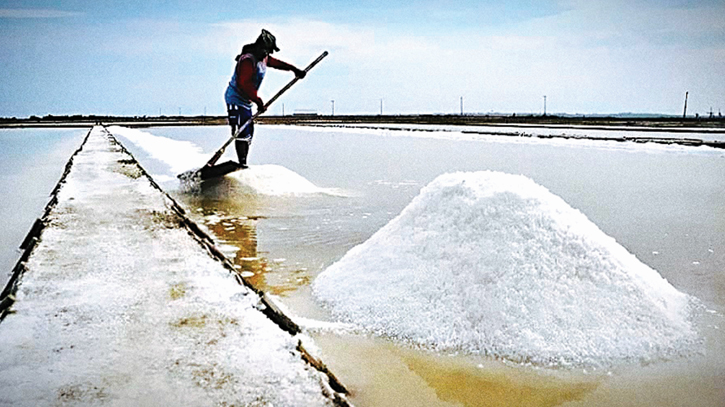
A worker is seen busy at a salt farm in the coastal area of Banshkhali, Chattogram. Photo: Messenger
The market price of unrefined raw salt per maund has recently dropped to less than half, causing significant concerns for farmers about potential losses. At the beginning of the season, Bashkhali coastal salt farmers were in high spirits due to favorable prices. However, this sudden price drop has left them disheartened and worried about their financial stability.
A large quantity of raw salt is currently stockpiled in the coastal areas of Bashkhali. Even though salt prices are typically low during the season, they tend to rise during the monsoon. With this in mind, farmers have been stockpiling their salt instead of selling it immediately. It has been reported that the 2022-23 fiscal year saw a record high salt production of 2,232,890 metric tons, the highest in the past 64 years.
Around 57,270 acres of land in Cox's Bazar and parts of Bashkhali are dedicated to salt cultivation, with at least 55,000 people actively engaged in this industry. Additionally, 80% of the region's population is involved in various related businesses. Such a drastic price drop in the market will significantly impact the income of these individuals and the overall economy of the region.
Currently, the market price of raw salt produced in the fields is only Tk 8.50 per kilogram, which translates to 350 Taka per maund. This is a stark contrast to the beginning of the season when the price ranged from Tk 500 to Tk 650 per maund. While farmers are struggling to get a fair price for raw salt at the field level, the price of refined and packaged salt remains disproportionately high. Farmers allege that unscrupulous traders have formed a syndicate to manipulate the market and halve the price of raw salt. They demand that the market price be determined considering the production cost and that imports be halted to save the domestic salt industry.
In Bashkhali, the current average price per maund of salt is Tk 350, a sharp decline from the Tk 500 to 650 Taka per maund at the start of the season. Farmers explain that the cost of all inputs and production has increased. With prices now halved, they won't even be able to recover their initial investment. In just 3-4 months, the field-level price has dropped by about Tk 300. Farmers warn that if this trend continues, the domestic salt industry will be severely threatened.
Salt trader Ansur Ali Talukder comments, “The government’s import of salt during the season causes a price drop in domestic salt. Why import when there is a record production of salt in the country in the last 64 years?” This sentiment is echoed by many in the industry who believe that unnecessary imports are harming local production.
Manzur Alam, a salt farmer from Madhukhali in Chunnua Union, says, “Some unscrupulous mill owners, failing to import foreign salt, are conspiring through a syndicate to deprive farmers of a fair price. It costs 317 Taka to produce a maund of salt. With the price dropping to 350 Taka per maund, we are incurring a loss of 33 Taka.” This small margin of profit is not enough to sustain the farmers, who are already facing high production costs.
Muhammad Ridwanur Rashid, Assistant General Manager of Bangladesh Small and Cottage Industries Corporation (BSCIC), told The Daily Messenger, “We have informed higher authorities to take necessary measures to ensure our farmers are not harmed.”
The government’s intervention is crucial at this point to stabilize the market and ensure that the farmers receive a fair price for their produce.
Without such measures, the future of the salt industry in Bashkhali and surrounding areas remains uncertain, and the livelihoods of thousands of farmers hang in the balance.
Messenger/Fameema








